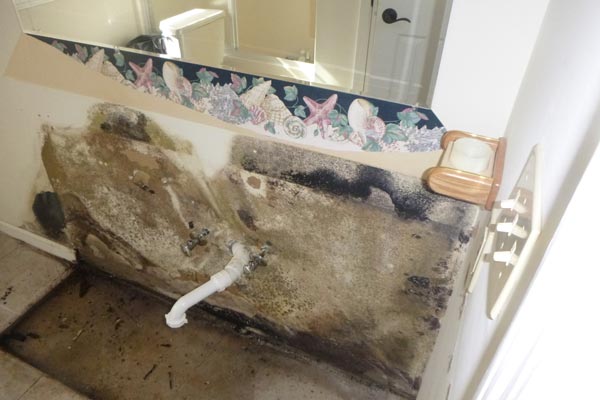
What is Black Mold?
If you’re at all familiar with mold, you’ve likely heard about the bad rap that black mold receives. This type of fungus actually encompasses several mold species that appear dark green and/or black. Most commonly though, when you hear “black mold,” Stachybotrys chartarum is being referenced. As an IICRC-certified mold removal and remediation company, Emergency Response Services, Inc. has seen its fair share of mold. For this reason, we’re bringing you everything you need to know to answer the question: what is black mold?
Is Black Mold Dangerous?
Contrary to popular belief, the shade of mold does not correlate to how hazardous it is. That is not to say that some molds are not toxic though. In the case of black mold, Stachybotrys chartarum, mycotoxins are produced, making this species toxigenic.
Mycotoxins naturally occur from mold and even certain foods, although they are known to generate negative health effects to humans. It is not uncommon to hear claims that black mold causes pulmonary hemorrhage or even memory loss. The CDC indicates that these cases are rare and the links causal, thus these statements cannot be proven.
Despite the lack of evidence to support such claims, experience has shown that some individuals are highly sensitive to black mold. In fact, exposure can cause a stuffy or runny nose, wheezing, itchy eyes, skin rashes, fever, and intense asthma reactions. The Institute of Medicine (IOM) drew the link between exposure to mold and upper respiratory tract symptoms in seemingly healthy individuals, asthma, and hypersensitivity pneumonitis in the immunocompromised. The World Health Organization took this research a step further in 2009, suggesting a link between mold, housing conditions, and asthma development in children.
Can Black Mold Kill You?
Despite the many adverse effects that black mold has on your health, it is impossible to conclusively indicate that black mold can kill you. Because black mold prompts reactions that may trigger conditions such as asthma or pneumonia that could lead to death, there is reason to treat mold with care. However, there is no scientific evidence that black mold in and of itself will kill you. It is best to operate under the guidance that a healthy home is one that is free of mold.
How Common is Black Mold?
The truth is that unless you live and exist within a sterile vacuum-like environment, you are constantly surrounded by mold. Mold is everywhere, and we are continuously breathing in spores. Black mold is relatively common as there are many species that present in this color. In terms of Stachybotrys chartarum, the prevalence is relatively low compared to other mold types. It should be noted though that toxic black mold rarely forms in isolation, and rather grows in conjunction with other mold types.
What Does Black Mold On Your Wall Look Like?
Fortunately, there are a few tell-tale signs of black mold. If you’re wondering what does black mold on your wall look like, keep these points in mind.
Mold requires a moisture source to grow. Therefore, if you notice water stains or peeling paint, it is possible that there is black mold growing behind the wall. Should you notice outwardly visible signs of mold growing, take note of its appearance. Black mold generally appears black in color, however can take on a dark green or even grey hue. The spores will be dampened downwards and be slimy.
While moisture and mold go hand in hand, it is possible for the water source to run dry. In these instances, the black mold may appear dry and powdery. If these toxic black mold symptoms are present, sniff the air. A musty odor is sure confirmation of a mold issue that will require professional mold removal and mold remediation services.

The Verdict: Treat All Mold the Same
If you find what you believe to be toxic black mold in your property, or any mold for that matter, treat it all the same. Mold has the potential to cause severe allergic reactions that can damage your health. Your best option is to seek professional mold removal and mold remediation to ensure your well-being. ERSI is always happy to answer your questions regarding what is black mold.
Sources: https://www.cdc.gov/mold/faqs.htm

